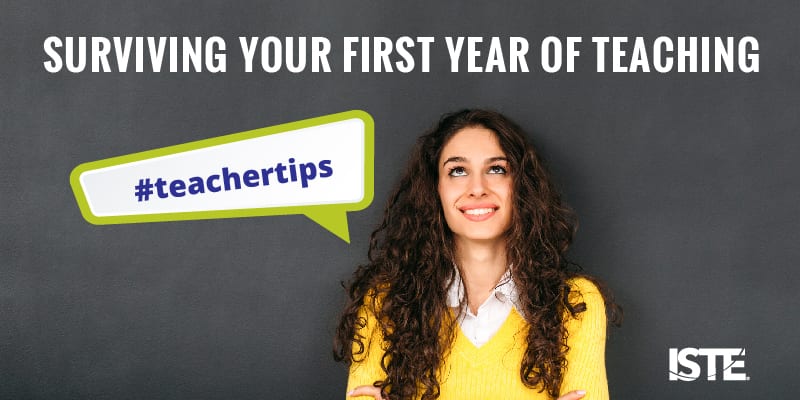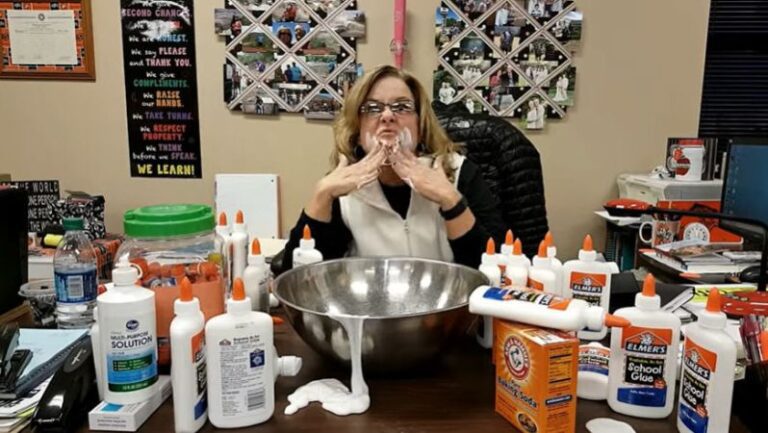The first year of teaching can be difficult, eye-opening, and even scary. But it is also filled with excitement, adventure, and endless learning opportunities. We asked teachers in ISTE’s Young Educator Network to offer up their best tips and ideas for successfully getting through the first year of teaching. These teachers in their 20s and 30s know what it’s like to survive that first year, and they were spot-on with their advice. Watch the video below, plus read even more great advice below..
[embedyt] https://www.youtube.com/watch?v=Be-Woe3h_po[/embedyt]
1. Find your teacher BFFs ASAP.
You can cry a river of tears to your mom, your significant other, or your college friends, but no one will get you quite like another teacher. “You have to find like-minded people. It will keep you sane,” suggests Fanny Passeport, an ed tech coach in Pune, India. #teacherBFF

2. Make it personal.
“Customize and personalize learning activities to address students’ diverse learning styles, working strategies, and abilities using digital tools and resources.” This is part of the ISTE Standards for Teachers, and it might sound a little bit overwhelming at first, but it’s not. Plus, down the road, it’s going to make YOUR life a whole lot easier! #personalizedlearning
3. Take care of your soul and soles.
“You don’t realize how much walking a teacher does. Spend money on more expensive shoes—they’re worth it,” says Jennifer Williams, an instructional technology coordinator in Covington, GA. In other words, it’s what’s on the inside that counts, but some of those outside parts are pretty important, too! #comfyshoes
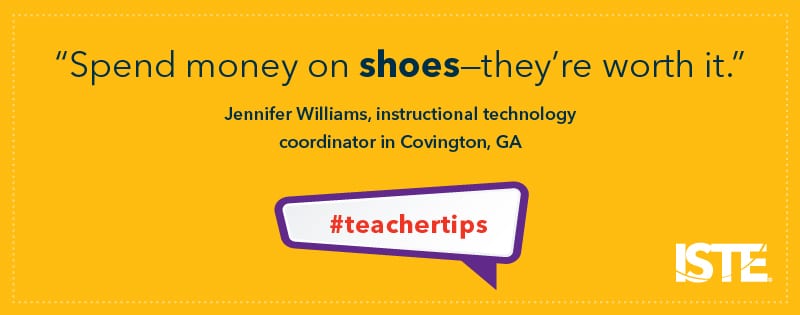
4. Shake it off.
Every teacher we talked to agreed that when you have a bad day, you have to just take a tip from Taylor Swift and shake it off. “If you have a bad day, brush your tears away and start new the next. Your students will still be there for that,” says Ixchell Reyes, a higher ed ESL instructor in Los Angeles, CA. #shakeitoff
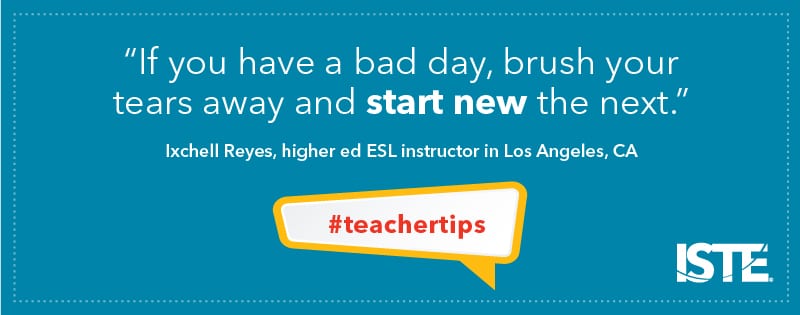
5. Master the makerspace.
What’s a makerspace? Just have a little chat with your nerdy side or inner child, and you’ll be able to create one just fine. Art, building supplies, creative objects—anything and everything goes! “Kids need to know they have a place to go to create. A makerspace encourages creativity and being inventive right there in your classroom,” Passeport says. Check out how to create your own in this article. #makersgonnamake
6. Don’t be afraid of technology.
“Coding is the future. Students as young as kindergarten can code right now,” Williams says. She’s right. If we don’t embrace technology and the resources we have right now, then our students are going to pass us by. It’s why organizations like ISTE and the Young Educator Network are so important in education today. #csforall
7. Say “Bye, Felicia” to your plans sometimes.
You’ll be so proud of yourself when you finally master the weekly lesson plan. But here’s the thing—sometimes you just have to wing it. Ya know, go with the flow. Roll with the punches. When life hands you lemons, you make lemonade. You get it. Well in case you don’t, take Bill Selak’s advice. He’s the director of technology for a school in Los Gatos, CA. “Trust yourself and be willing to do more projects with your students,” he says. “I really wish I would’ve done less worksheets and trusted myself.” #byefelicia
8. Be cool (but not too cool).
You actually can gain students’ respect without becoming pals with them on SnapChat or Instagram. “Take an interest in your students. When you do this, they start to trust you,” says Leslie Pralle Keehn, an instructional technology consultant in Blairsburg, IA. #nottoocoolforschool
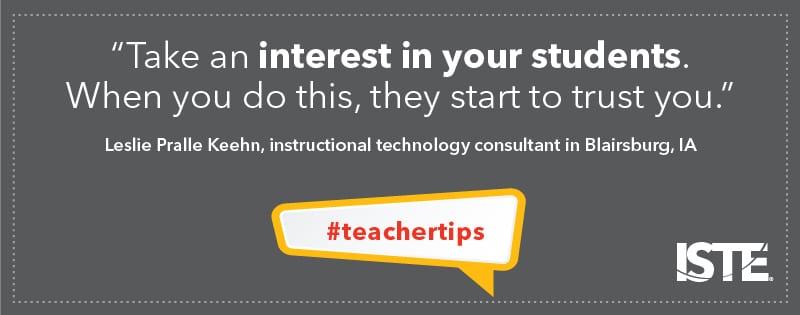
9. Find your center—ommmmmmm.
You might feel like you have NO IDEA what is going on during the madness of your first year, but don’t get lost in the bustle. Remind yourself monthly, weekly, or even daily if needed, why you got into this profession in the first place. This is sound advice from Sarah Diaz, a kindergarten teacher in Madrid, Spain. “Teaching is a passionate profession—don’t forget to develop who you are along the way,” she says. #findyourcenter
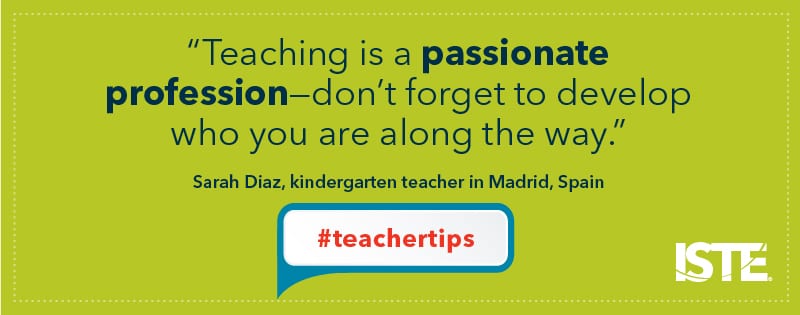
10. Be the student.
College might be over, but now you have a whole new set of things to learn. And guess what? Your teachers are probably younger than you now. “One of the beautiful things about technology is that it’s always new and ever changing. Learn with your students. Sometimes they teach you, and that’s okay,” says Sarah Fox, third grade teacher in GIen Ullin, ND. #learnsomethingnew
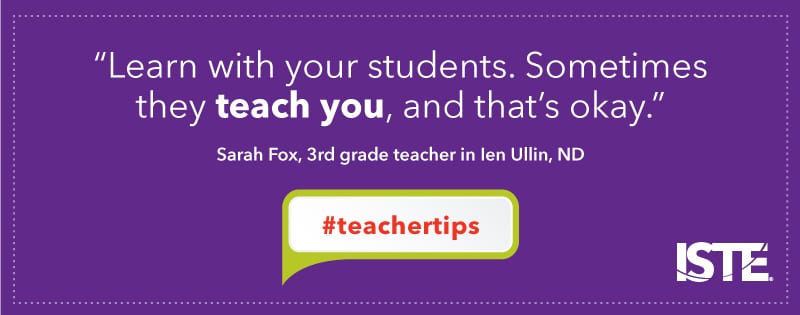
11. Embrace your inner nerd.
There are so many cool opportunities for using technology in the classroom, including game-based learning, videoconferencing with experts around the workd, and virtual reality tours of famous landmarks, distant planets and even the human body. “Use VR. It gives students the opportunities to explore things they might not otherwise be able to explore,” says Mary Ellen Weeks, an instructional coach in Reynoldsburg, OH. #gamifylearning
12. Technology isn’t always the answer.
Balance is everything, and the teachers who can figure this out will have long-term success. “Technology is a tool just like scissors or pencils. It’s important to use the right tool for the job. You have powerful devices, and they have a time and place, but you don’t have to use them all the time,” says Selak. #techieteacher
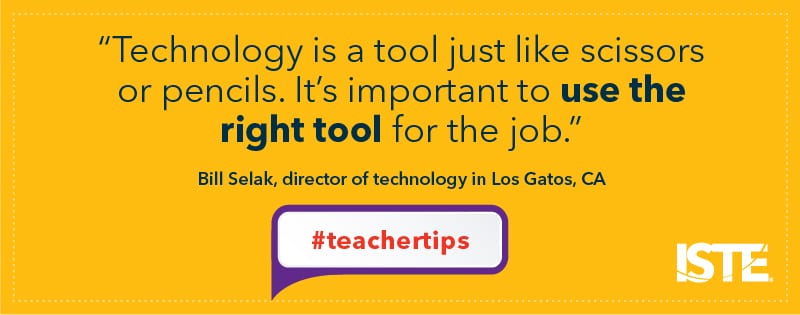
13. Get with the Digital Age.
Communicate information and ideas to students, parents, and peers using digital media. This is part of the ISTE Standards for Teachers, and it’s definitely a good goal to work toward. Keep in mind that some admins or school districts are right in the middle of changing their approach on digital and online communication, so you might have to be a little patient. But keep on it because it’s going to improve overall reach to students and parents. #digitalagelearner
14. Go out on that limb—way, way out.
“If I hadn’t gone out on that limb, my students really wouldn’t have benefited from any of the things I tried,” Weeks says. Take her advice and make it a goal to try at least three new things this year. You won’t know unless you try. #outonalimb
15. Don’t stop believin’.
You’re going to have bad days. You’re probably even going to have moments where you wish you’d become an accountant instead. But it does get better. It will get easier. And this job has rewards like very few other careers. So take this advice from Fox. “No matter what happens in your first year of teaching, you have to keep going.” #dontstopbelievin
Looking for more support? Check out our Facebook page, exclusively for new teachers!
Join our Facebook group WeAreTeachers—First Years! to connect with other new teachers, and learn more about how you can navigate your classroom and life.
